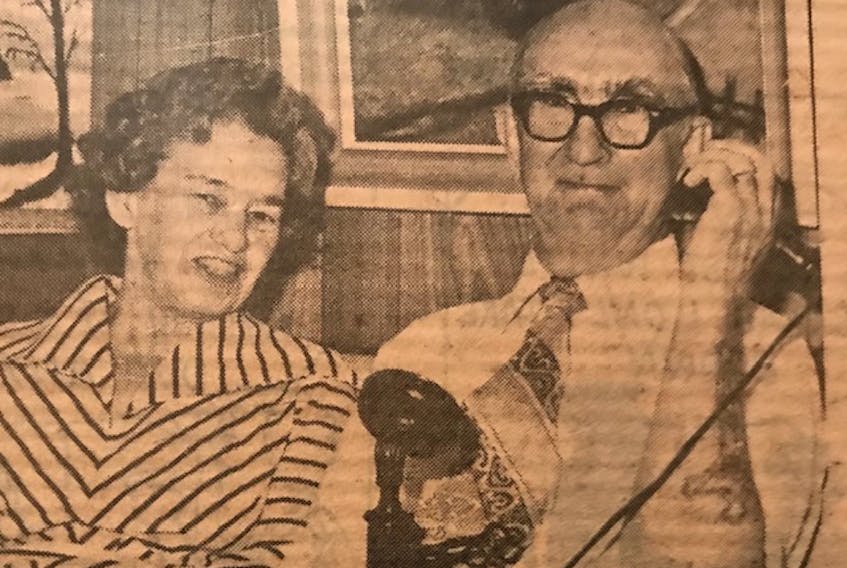In 1974, Prince Edward Island boxing scribe Wilf McCluskey described Albert (Butcher Boy) MacDonald as a fighter in a class with other “fast-moving, hard-hitting, little ring scrapers.”
McCluskey was remembering MacDonald because of four memorable fights he had in a span of six weeks knocking out various tough contenders on the island of spuds with “both fists flying and with eyes flashing like an alley cat in the dark.”
According to McCluskey all the 'Butcher Boy' wanted to do was “bang away and he had the proper equipment to do the job. He didn’t stand much higher than a good-sized haymaker, and he never weighed more than 125 pounds.

Albert MacDonald was born in Glace Bay in 1910 and moved to New Waterford in 1913 with his mother and father, John James MacDonald. He started boxing in 1925 in an old 'Pluck Me' coal company store with trainer Jack 'The Barber' Fraser, Stanley Poitier, and middleweight contender Pal Clark of Inverness.
MacDonald was boxing in the first big heyday of the sport in Cape Breton. Ring battles were held at the Lyceum Theatre in Sydney, the Savoy in Glace Bay, and in numerous local clubs in various towns including New Waterford. MacDonald worked at Jimmy Johnstone’s Meat Market in New Waterford and it was there he earned the moniker, 'Butcher Boy.'
He won his first title in 1928, the Cape Breton Flyweight Championship. From there he next won the Maritime title with a victory over Preston Donovan of PEI. In 1931, he kept his Maritime title with three successive victories at the Wanderers Grounds in Halifax.
Through his ring career, MacDonald fought several times a month and would fight weekly if the opportunity existed. McCluskey said, “he took them as they came and scored a great number of wins over some of the best club fighters in the business.”

In one period MacDonald held the bantamweight, flyweight and featherweight championships at the same time. Some of his best fights were against Kid Hart of Moncton, Kid Lantz of Halifax, Walter Schultz of Halifax and Hooker MacDonald, Wilfred Clements and Johnny Corbett all of his hometown of New Waterford.
MacDonald fought out of New Waterford, New Glasgow, Halifax, Charlottetown and even a spell in Toronto. He was considered one of the biggest boxing attractions of his era in the Maritimes where according to McCluskey “fans flocked to fight arenas in droves to see him in action.”
McCluskey described MacDonald as a fighter “who had above-average intelligence, could box extremely well, could slip and duck punches, and carried just enough punching power in both maulers to dispose of an opponent with a single punch.”
MacDonald enlisted in the army when The Second World War broke out and continued to box. At the time the Canadian army had a fine tradition of boxing within its ranks and MacDonald quickly joined them. He fought some of the best in the country and became featherweight champion in Sept 1941. While stationed in Borden, England, in 1942 he won the base area championship. MacDonald’s last fight was in England in 1943 culminating an 18-year career of over 80 bouts, winning 70 or more of them.

MacDonald returned to New Waterford after the war and still retained an interest in the sport. He was one of the first who began training one of Cape Breton’s best boxers in the 1940-50s period, 'Tommy Gun' Spencer. He was an active community worker, a member of the Lions Club, the Knights of Columbus, and chaired the New Waterford Centennial Year Committee.
He took an interest in landscape painting and collected various antiques. MacDonald had four children with his wife Isabel Gillis and was remarried to Beatrice Weaver after Gillis died.
He was a businessman, ran a restaurant and was owner/operator of the Belmont Tavern and later the Heather Beverage Room, which he operated with his sons, Albert Jr. and Charlie.
Albert MacDonald died in 2000. Ironically, the building he operated for years as the Heather Beverage Room now houses the Coal Town Boxing Club which boasts an active membership. Likely the spirit of the little ring scrapper known as the Butcher Boy fills the place.
Paul MacDougall is local area writer and a senior instructor in health sciences at Cape Breton University.









